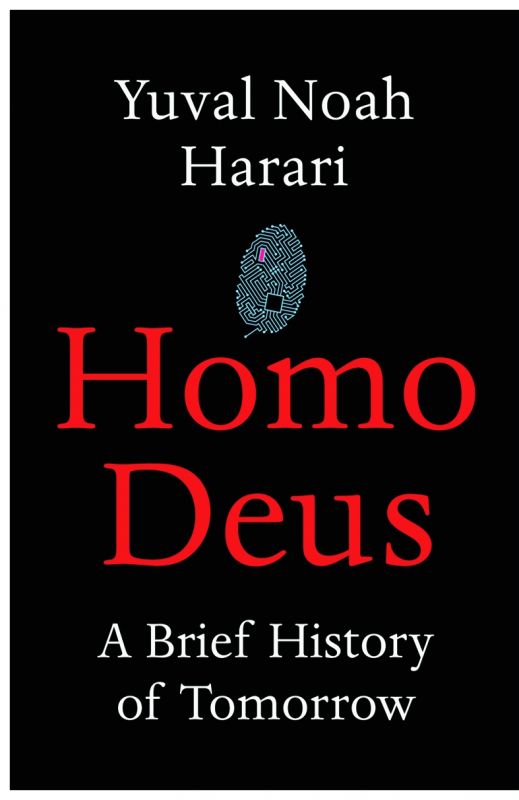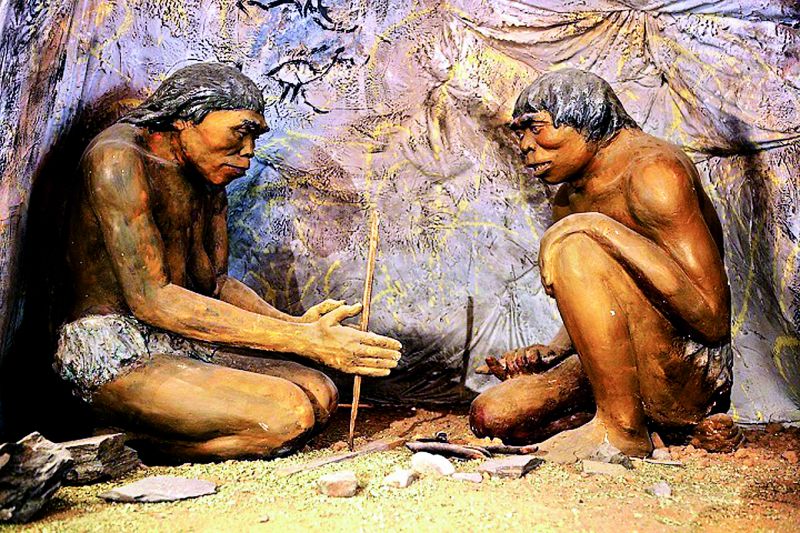Noah's arc of humanity

A dystopian world. And its hubris is what Israeli historian Yuval Noah Harari has scored the annals of history, biology, economics and science to understand. An angst about the world, searching for answers about god, life and humanity, he wrote the international bestseller Sapiens: A Brief History of Humankind in 2014 which skims through this break-less train mankind has embarked upon — with profound understanding of what the world and human, both have morphed into. His most recent book Homo Deus: A Brief History of Tomorrow was published in Hebrew in 2015. The Oxford scholar (doctorate) born in Haifa in 1976 explores the human growth story, that falls short of realising the futility of progress without responsibility.
What many don’t know about this erudite professor is the catharsis Prof Harari himself underwent, asking tough questions, troubled with the wealth of knowledge he coursed through, and finally accepting certain inalienable truths. A follower of Vipassana, Harari believes implicitly in meditation and learnt from the master himself, “As a teenager in Israel, and later as a student at the University of Oxford, I was a very troubled person. The world made no sense, and I got no answers to the big questions about life. I didn’t understand why there was so much suffering in the world and my own life. All I got from people and books were fictional stories about God, nation, family and career. I had the sense to realise they were not the truth. I had the courage to admit it to myself, but I had no idea how to find the truth about life. While I was studying at Oxford, a good friend nagged me for a year to go try a Vipassana meditation course. I thought it was some new-age mumbo-jumbo, and declined, but after a year, I gave it a chance. What could I lose?” asks the historian who won the Polonsky Prize for Creativity and Originality in 2009 and 2012. In 2012 he was elected to the Young Israeli Academy of Sciences.
Learning about the art of breathing from a historian who has been theoretically in the trenches of military history, is in itself a revelation, and Professor Harari recalls his initiation, “Our teacher S.N. Goenka instructed students to sit crossed legs, closed eyes and start meditating — observe the breath coming in and out. ‘Don’t do anything,’ he kept saying, ‘don’t try to control the breath. Just observe present reality, whatever it may be. When the breath comes in, you know — now the breath is coming in. When the breath goes out, you know — now the breath is going out. And when you lose focus, and your mind starts wandering in memories and fantasies, you just know — now my mind has wandered.’ It was the most important thing anybody ever told me in life. It was like a million tons being lifted off my shoulders. If you want to know the truth, you don’t need to believe in any story, you don’t need to understand any complicated theory, and you don’t need to control, create or judge. You just need to directly observe the reality of the present moment. It answered some existentialist questions — the deep source of suffering were in the patterns of our own mind.”
The Ted-X speaker also offered a free online course — A Brief History of Humankind which more than 1,00,000 people signed up for. But back to Vipassana, sitting and observing his breath, Harari realised this was what he had been looking for his whole life. “I meditate for two hours a day. It is not an escape from reality. It is getting in touch with reality. At least for two hours a day, I observe reality as it is, while for the other 22 hours, I get overwhelmed by emails and tweets and funny cat videos,” he says, a hint of his irreverent humour peeking through.
 Homo deus: a brief history of tomorrow by Yuval Noah Harari Rs 1,404, pp 448 Harvill Secker
Homo deus: a brief history of tomorrow by Yuval Noah Harari Rs 1,404, pp 448 Harvill Secker
Excerpt (from Homo Deus)
Studying history aims to loosen the grip of the past. It enables us to turn our head this way and that, and begin to notice possibilities that our ancestors could not imagine… Studying history will not tell us what to choose, but at least it gives us more options.
Hindsight to gauge how progress might hide greater upheaval in its tread, Harari feels our pathbreaking scientific leaps are foreboding, “In the 21st century, humans will upgrade themselves into gods. Literally. Humans will acquire abilities that traditionally were thought to be divine. In particular, the ability to engineer and create life. In the 21st century, we will learn how to design and manufacture animals and plants, and even humans. We will use genetic engineering to create new kinds of organic beings; we will use direct brain-computer interfaces in order to create cyborgs (beings with organic and inorganic parts); and we may even succeed in creating completely inorganic beings. Whether this will be good or bad, is a different question. It has both good and bad potential. Technology is never deterministic. We can use the same breakthroughs to create different societies. For example, trade in human organs is now both possible and potentially lucrative, but it has so far remained a peripheral activity. In the 21st century, the rise of AI and biotechnology will transform the world, but it does not mandate a single deterministic outcome. We can use it to create very different societies. How to use them wisely is the most important question facing humankind. It is far more important than the global economic crisis, wars in the Middle East, or refugee crisis in Europe. The future not only of humanity, but probably of life itself, depends on how we choose to use AI and biotechnology.” Words that echo the irreversible nature of AI.
The question is important
Every writer goes into an abyss of knowledge, and emerges with a hazy blueprint. The Israeli professor follows a pattern to pry through the wealth of knowledge. “I focus on the question, not my answer. I follow where it leads me — history, biology, economics or psychology. As long as I am focused on the question, I don’t lose my way. Very often, people start with a question, but develop a theory, become far more interested in defending that theory than in the question. And because it is very hard to be an expert in different fields, as you attempt to defend your theory, you entrench yourself in just the discipline you know best. As you lose sight of the question, and focus on your own theory, you are less and less likely to admit your ignorance. Admitting ignorance gives clarity. If you don’t know something, just say you don’t know — don’t start inventing explanations to cover up your ignorance!” advises the man who has written innumerable articles and books like Armchairs, Coffee and Authority: Eye-witnesses and Flesh-witnesses Speak about War, with his speeches viral on the Internet.
In the Indian context, a vastly agricultural society, is that in our favour? Harari explains, “Humans often do things that harm their own interests, as it is difficult to predict the long-term consequences of our actions. An excellent example is the Agricultural Revolution. Ten thousand years ago people thought farming would make lives better, and this was true of kings and emperors, but for the average peasant in ancient India or medieval Europe, life became worse. Farmers worked harder than hunter-gatherers, they got a worse diet, they were far more exposed to famine and plague, and they suffered far more from political inequality and social exploitation. If their Stone Age ancestors could see their living conditions, I don’t think they would be jealous. They would much prefer going to the forest to look for mushrooms and hunt deer! The Agricultural Revolution is the classic case of humans inventing a new technology, but instead of it helping us live a better life, we become slaves to technology. It produces lots of power, but not a better life. We should be careful that the rise of AI in the 21st century won’t result in something like the Agricultural Revolution —enriching a tiny elite while enslaving majority of humans.”
Philosophical context
Modern culture rejects this belief in a great cosmic plan. We are not actors in any larger-than-life drama. Life has no script, no playwright, no director, no producer — and no meaning. To the best of our scientific understanding, the universe is a blind and purposeless process, full of sound and fury but signifying nothing. During our infinitesimally brief stay on our tiny speck of a planet, we fret and strut this way and that, and then are heard of no more. Since there is no script, and since humans fulfill no role in any great drama, terrible things befall us and no power will come to save us, or give meaning to our suffering. There won’t be a happy ending, or a bad ending, or any ending at all. Things just happen, one after the other. The modern world does not believe in purpose, only in cause. If modernity has a motto, it is “shit happens”.
This message, his Ted talks and discourses across the globe have a simplicity and dry wit, an endearing directness which makes it relatable and strikes a chord with readers. Harari himself is a man of utmost simplicity in living. It has been reported that he shies away from smart phones, and prefers long walks in the forest with his dog. If history shapes present and future, one of the big questions that has interested him is why men dominated women. “You can learn a lot about relations between men and women by comparing them to the relations between males and females among chimpanzees, and other animals. Why is it that in a species whose success depends above all on cooperation, individuals who are supposedly less cooperative (men) control individuals who are supposedly more cooperative (women)? I don’t know. I freely admit my ignorance instead of inventing some fanciful explanation. That helps me preserve my clarity of vision!” he candidly explains, also providing an insight into Harari’s journeys into time periods, theories, etc. all spearheaded by trying to understand, or demystify life, an inexhaustible search.
World leaders need to do...
Given the human’s ability to destroy itself, Harari feels, “World leaders should focus on creating a global human community — good cooperation between nations. The main problems today are all global and we need effective global cooperation rather than nationalist protectionism. For eg, climate change threatens the prosperity and even survival of human civilisation. It won’t be enough if only India reduces greenhouse gas emissions while the USA continues with business as usual, and it is very unlikely that any one country will agree to hamper itself with strict environmental regulations while its economic competitors refuse to do the same. Another threat we face is disruptive technologies such as AI and bioengineering. A single government cannot do much about the dangers inherent in AI and bioengineering, because science and technology are global rather than national projects. No nation can regulate AI single-handedly. Similarly, we need to create a global safety net to protect humans against the economic shocks that AI is likely to cause. We now have a global economy, but politics is still very national. Unless we find solutions on a global level to disruptions caused by AI, entire countries might collapse, and the resulting chaos, violence and immigration waves will destabilise the entire world,” he explains. Leaving us to contemplate what we ourselves have created — a world on a ferocious momentum one can’t begin to fathom.
A simpler era?
Harari has spoken about how the Stone Age man was better equipped than our tech-savvy selves, and while modern technology has distanced us from our bodies, he also thinks that we are losing our ability to pay attention to what we smell, touch and taste. We are far more interested in what is happening in cyberspace. “In the past, humans could not afford such carelessness. Ancient foragers and peasants were always alert and attentive. Wandering in the forest in search of mushrooms they watched the ground intently for any tell-tale bulge, they sniffed the wind carefully in case a tiger might be approaching, and they listened to the slightest movement in the grass to learn whether a snake might be lurking there. Today we don’t need such keen awareness. People estranged from their bodies, senses and physical environment are likely to feel extremely alienated and disoriented. Pundits often blame such feelings of alienation on the decline of religion and of nationalism, but losing touch with your body and with your environment is probably more important. If you don’t feel at home in your body, you will never feel at home in the world. So the best advice I can give on this is to get back in touch with your body.” Advice well-heeded. Harari with lives his partner in Moshav (a type of cooperative agricultural community of farms near Jerusalem). The vegan argues that animal farming is the worst crime in history, and so is the far reaching effects of the agricultural revolution. This is the message he is travelling across the world to impart… for better sense to prevail.
A massive new class
Scientific research about the human mind and the human experience has been conducted on people from Western, educated, industrialised, rich and democratic (WEIRD) societies, who do not constitute a representative sample of humanity. The study of the human mind has so far assumed that Homo sapiens is Homer Simpson! In a groundbreaking 2010 study, Joseph Henrich, Steven J. Heine and Ara Norenzayan systematically surveyed all the papers published between 2003 and 2007 in leading scientific journals belonging to six different subfields of psychology. The study found that though the papers often make broad claims about the human mind, most base findings on exclusively WEIRD samples. For example, in papers published in the Journal of Personality and Social Psychology, 96 per cent were from this group. We would be well-advised to be cautious about studies, and of how we view progress, because Harari feels, “By 2040, we may see the creation of a massive new class — the useless class. Billions of people who are not just unemployed, but unemployable. We don’t have any economic model for such a situation. How to deal with the useless class may well be the greatest economic and political question of the 21st century,” the professor explains.


